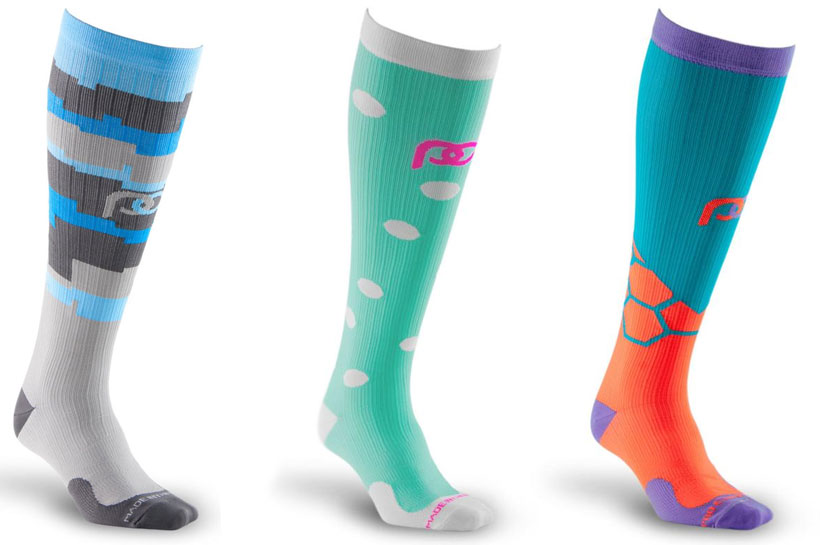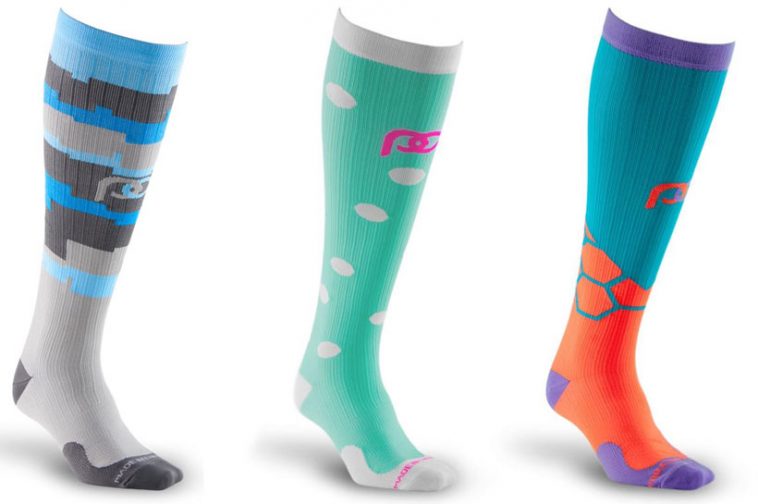- Like
- SHARE
- Digg
- Del
- Tumblr
- VKontakte
- Flattr
- Buffer
- Love This
- Save
- Odnoklassniki
- Meneame
- Blogger
- Amazon
- Yahoo Mail
- Gmail
- AOL
- Newsvine
- HackerNews
- Evernote
- MySpace
- Mail.ru
- Viadeo
- Line
- Comments
- Yummly
- SMS
- Viber
- Telegram
- JOIN
- Skype
- Facebook Messenger
- Kakao
- LiveJournal
- Yammer
- Edgar
- Fintel
- Mix
- Instapaper
- Copy Link

Have you ever noticed swelling, numbness, or persistent tingling in your lower legs?
If so, you may be one of the millions of Americans who would benefit from wearing compression socks. They help reduce potentially harmful pooling of blood in the extremities.
Too many people thought have no idea what compression socks actually are. Today we’ve put together a guide to how compression socks work and who can benefit from wearing them.
What Compression Socks Are
Compression socks are specially made medical socks designed to apply pressure to your lower leg. They’re great for boosting the circulation of blood from your lower legs to the rest of your body.
A lot of people don’t realize that poor or reduced circulation can be very serious. Many conditions can cause the veins and arteries of your legs to harden or narrow.
This leads to reduced blood flow to your extremities and can even cause blood clots to form. Other common signs of poor circulation include:
- Tingling
- Numbness
- Stinging pain in your limbs
- Muscle cramps
- General fatigue
If you notice any of these on a persistent basis you should talk to your doctor as soon as possible.
How Compression Socks Work
At their most basic compression socks are just extra tight socks designed to squeeze or compress your leg. This helps prevent blood and lymph fluid from pooling in your feet and calves.
When you first put on a pair of compression socks you’ll probably feel a little discomfort. They’re much sturdier and tighter than normal socks. Once you get used to them though you’ll no doubt notice fewer aches and pains in your feet.
Who Should Use Compression Socks
There are lots of people who can benefit from wearing compression socks. We’ve divided them up into medical conditions and everyday uses.
Athletes
For decades athletes and coaches have been touting the benefits of compression socks and compression sleeves. The same squeezing tightness that helps people with medical conditions also improves overall blood flow for athletes.
The compression socks aid in the absorption of oxygen in the lower leg. This improves overall performance and helps the body remove lactic acid from the muscles. Like most athletic focused apparel these types of colorful compression socks are available in a range of styles and patterns.
Pilots and Frequent Flyers
Whenever you fly your body is subjected to much lower pressure conditions than on the ground. This causes blood and other bodily fluids to pool in your extremities.
Pilots and other frequent flyers should invest in a quality pair of flight-specific compression socks. These specialize in preventing the edema, or swelling, that can occur.
Office Workers
Sitting for long periods of time can be just as bad for circulation as standing. Ideally, you should have a mix between sitting, standing, and walking but that just isn’t possible all the time. Every day wear compression socks can help reduce the risks of office work to your limbs.
Medical Conditions requiring Compression Socks
There are several potentially serious medical conditions that benefit from consistent use of compression socks.
Peripheral Artery Disease
Peripheral artery disease is a narrowing of the arteries in the limbs and extremities of the body. It’s caused by atherosclerosis and reduces the blood flow to your limbs.
Compression socks can help reduce the effect of pooling blood in the legs and prevent the formation of deep vein thrombosis. This is a potentially fatal blood clot in the legs.
Varicose veins are twisted or enlarged veins most commonly found in the leg. They commonly result from standing or applying pressure to the legs for long periods of time.
In most cases, they’re just a cosmetic concern but if left unchecked they can lead to complications. Wearing compression socks can help prevent the formation of varicose veins and reduce the effects of their symptoms.
Diabetes
Diabetes is one of the most common reasons to wear compression socks. This is especially true for type 2 diabetes. Many diabetics suffer from poor circulation. If left unchecked, this can lead to pooling of the blood in the limbs.
With new techniques and materials, available diabetics can now pick out colorful compression socks that make a statement or match their skin tone.
Put Your Health First
Changing your style for your health is never easy. Thankfully compression socks are now designed in a wide variety of styles, colors, and patterns. Find the ones that best match your needs and personal style.
About Jason Spencer
Jason Spencer has a tremendous enthusiasm for all facets of health, fitness and physical performance that stems from an athletic lifestyle from childhood. Jason was fortunate enough to compete in collegiate football and learned to love the challenges that physical activity placed on the body. As Jason progressed through his higher education and became increasingly aware of how science is applied to physical activity and how it reveals the benefits of exercise, he realized very quickly that he wanted to pursue a career that gives him the opportunity to teach others to compete, challenge, and push themselves towards something more valuable to them than anything else; health, fitness and self worth. Being a fitness professional allows Jason to do this for them and he is always incredibly grateful for that. Jason has a Bachelor of Science degree in Neuroscience from Muhlenberg College in Allentown, PA. Neuroscience and his acquired knowledge of the nervous system and muscle stimulation techniques has been extremely instrumental towards building a unique ability and feel for training the body for optimal form and function. As a personal trainer he is certified with ACSM (American College of Sports Medicine). He's also a strength & conditioning specialist with NSCA (National Strength & Conditioning Association). He has additional certifications in both kettlebell principles & techniques (Equinox), and Flexibility & Corrective Exercise (Swedish Institute of Health Sciences in NY). Jason has worked as a trainer and conditioning specialist in a variety of fitness facilities over the years such as: LA Fitness in Piscataway, NJ, the YMCA in Metuchen, NJ, and Equinox Fitness Clubs in New York, NY. He also does private in-home sessions all over the Manhattan area.

